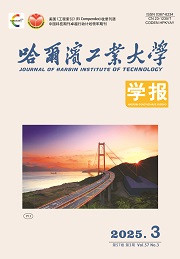| 引用本文: | 许海雨,罗凯,黄闯,左振浩,董兴杰.通气超空化对水下火箭发动机性能影响[J].哈尔滨工业大学学报,2021,53(6):41.DOI:10.11918/201911018 |
| XU Haiyu,LUO Kai,HUANG Chuang,ZUO Zhenhao,DONG Xingjie.Influence of ventilated supercavitation on underwater rocket engine[J].Journal of Harbin Institute of Technology,2021,53(6):41.DOI:10.11918/201911018 |
|
| 摘要: |
| 火箭发动机具有功率密度大、推力大等优势,常被用作主动攻击高速水中兵器的推进器.然而,火箭发动机在水下工作时喷管出口压力发生剧烈脉动,进而影响发动机的推力性能,甚至造成安全事故.为研究火箭发动机在水下的工作特性和尾流场特性,基于VOF多相流模型和理想气体模型,建立了高温高压燃气水下超声速喷流的数值模型,分别在单相水来流和通气超空化来流条件下对火箭发动机的内外流场进行仿真计算,获得了通气超空泡、工作压力等因素对火箭发动机尾喷流场的影响规律.研究结果表明:无通气超空化时,尾喷流存在明显的颈缩、胀鼓、回击等非定常现象,发动机推力剧烈脉动;存在通气超空化时,火箭发动机喷出的燃气与超空泡内气体掺混排出,尾流场的非定常特性显著减弱,发动机推力未产生剧烈脉动;当发动机工作压力增大为设计压力一倍时,在无空化条件下燃气流量及发动机推力分别产生30.4%和20.6%的振荡幅度,在通气超空化条件下发动机的工作性能几乎不受工作压力的影响. |
| 关键词: 水下火箭发动机 水下燃气射流 压力脉动 多相流 通气超空化 |
| DOI:10.11918/201911018 |
| 分类号:V238 |
| 文献标识码:A |
| 基金项目:国家自然科学基金(8,2);中国博士后科学基金(2019M653747) |
|
| Influence of ventilated supercavitation on underwater rocket engine |
|
XU Haiyu1,LUO Kai1,HUANG Chuang1,ZUO Zhenhao1,DONG Xingjie2
|
|
(1.School of Marine Science and Technology, Northwestern Polytechnical University, Xi’an 710072, China; 2.The 705 Research Institute, China State Shipbuilding Industry Corporation, Xi’an 710077, China)
|
| Abstract: |
| Rocket engine has the advantages of high-power density and large thrust, which is often used as the thruster to attack high speed underwater weapons. However, the outlet pressure of the nozzle pulsates violently when the rocket engine is working underwater, which affects the thrust performance of the engine and even causes accidents. To investigate the operating characteristics and wake field characteristics of underwater rocket engine, based on the VOF multiphase flow model and the ideal gas model, a numerical model of supersonic gas jet under high temperature and pressure was established. The internal and external flow field of the rocket engine was simulated under the conditions of single-phase water flow and ventilated supercavitation, and the influence of factors such as ventilated supercavity and operating pressure on the gas jet flow of the rocket engine was obtained. Results show that under the condition of fully wetted vehicle, unsteady phenomena including neck shrinkage, bulge, and back attack occurred in the gas jet flow, and the engine thrust pulsated violently. Under the condition of ventilated supercavitation, the gas of the rocket engine mixed with the gas in the supercavity and discharged, the unsteady characteristic of the wake field was significantly reduced, and there was no violent pulsation. When the operating pressure was increased to the twice of the design pressure, under the condition of fully wetted vehicle, the oscillations of gas mass flow rate and engine thrust were 30.4% and 20.6% respectively. However, the operating performance of the engine was hardly affected by the operating pressure under the condition of ventilated supercavitation. |
| Key words: underwater rocket engine underwater supersonic gas jet pressure pulsation multiphase flow ventilated supercavitation |







